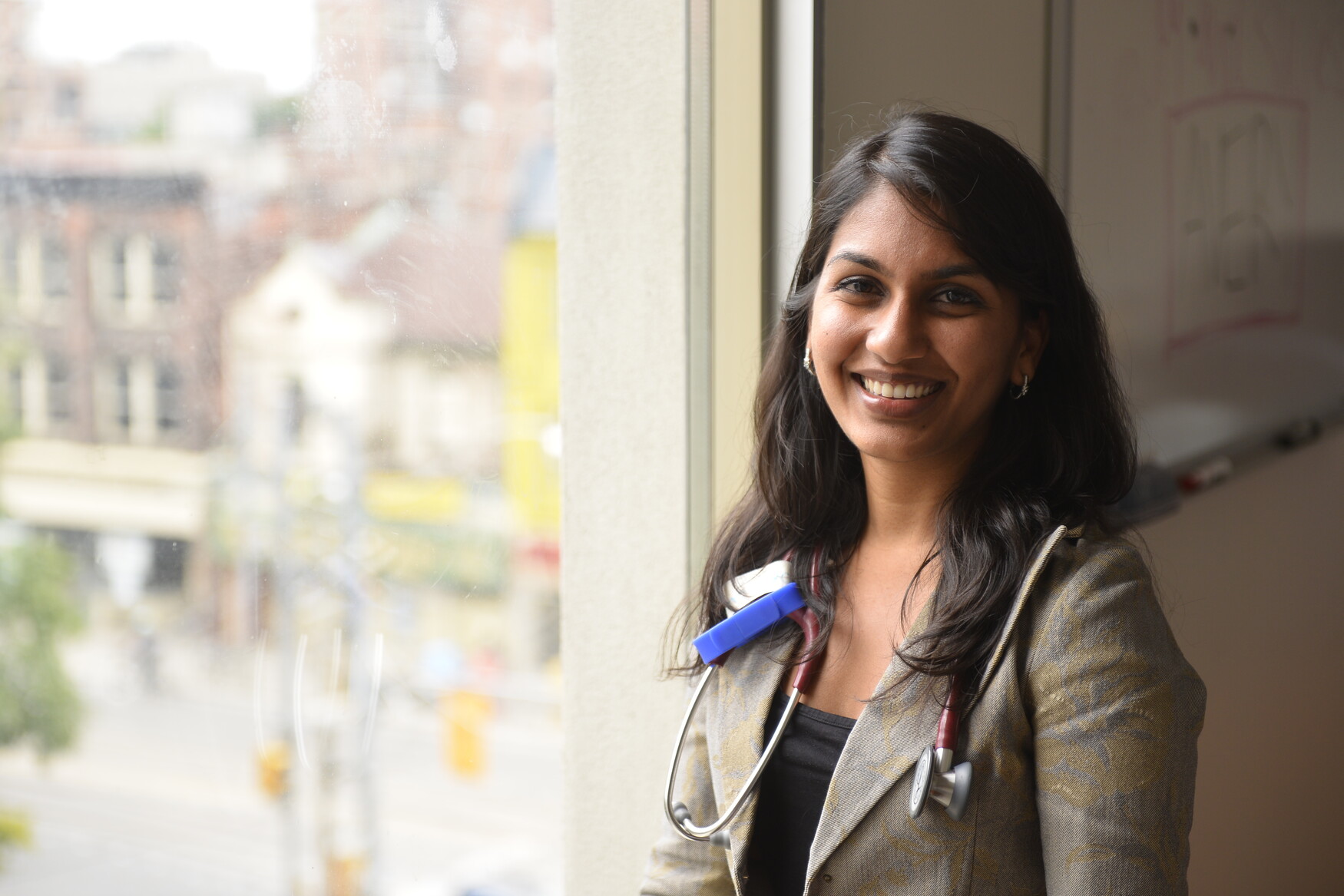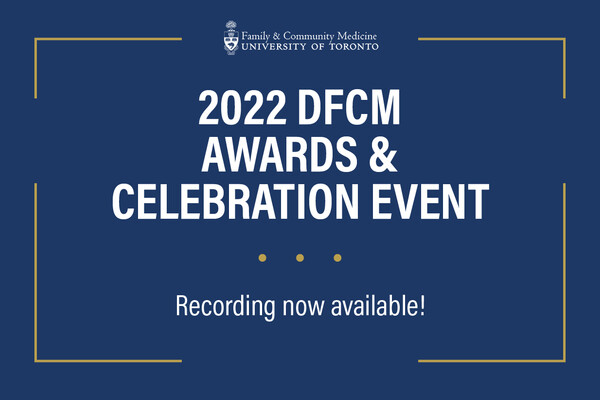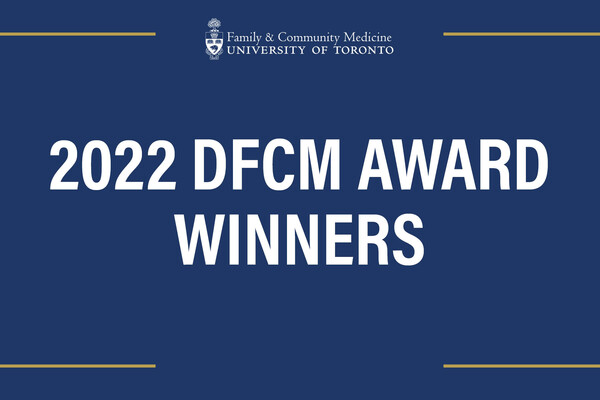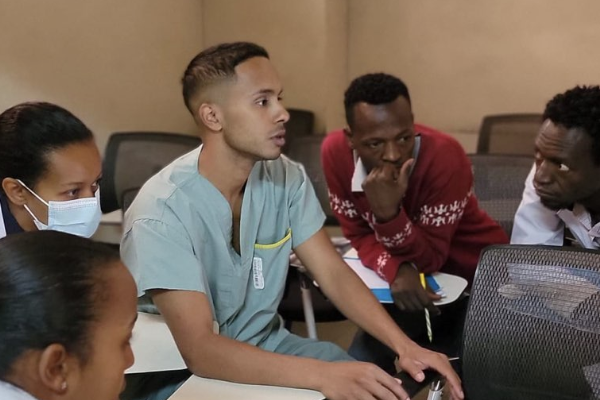DFCM Announces New Faculty Lead in Social Accountability

Dr. Ritika Goel is now the University of Toronto Department of Family and Community Medicine (DFCM)’s first Faculty Lead in Social Accountability. In the role, Dr. Goel will have an opportunity to think systematically about how DFCM infuses social accountability into our work, whether as clinicians, teachers, researchers, leaders or advocates.
This new position was created under a recently renamed portfolio that links social accountability to global health, in recognition of the central role social determinants play in shaping health. It builds on decades of DFCM efforts, centrally and through our many sites and divisions, to address the complex health needs of individuals and communities most at risk due to adverse social determinants of health. It acknowledges that all family physicians and family medicine teams care for individuals whose social needs have a substantial impact on their health outcomes and that addressing these complex needs requires a deliberate and evidence-informed approach.
Dr. Goel has dedicated much of her clinical career working in clinical settings focused on serving marginalized communities. She has worked extensively in the shelter and drop-in system, as well as in community health centres and sexual health clinics. This experience, along with her work as a community activist with groups such as OHIP for All and Canadian Doctors for Medicare, and her passion for health equity and social justice, will help her in this role to support and enable department-wide efforts to address the health needs of those members of our community most impacted by adverse social determinants of health.
We spoke with Dr. Goel about what her plans are for this role and what it means to her.
What does this role entail and how does this fit in with the work you’re already involved in?
Social accountability is about meeting the priority health and social needs of our communities as determined by our communities, using an equity lens first and foremost. This means thinking about applying that equity lens to all that we do and thinking deeply about how our structures can support the best care for marginalized people as individuals and communities. Given my role at the College of Family Physicians of Canada as the chair of the Social Accountability Working Group as well as the clinical, advocacy and medical education work I'm involved in, thinking about social accountability and social justice in primary care has been a longstanding interest of mine.
This role fits well with my particular interest in bringing anti-oppressive practice approaches to primary care. Learning how to engage in critical self-reflection and learning about concepts like power and privilege can be incredibly powerful in better meeting the needs of our communities as primary care providers. In designing and delivering CPD and medical education initiatives, I have worked with amazing people to think deeply about how to bring such concepts to every medical learner or practicing family physician. As part of the St. Michael's Family Health Team, I have been grateful to bring some of this thinking to the Social Determinants of Health Committee, which works to infuse an equity and SDOH lens to the existing programs, and conceptualize building new ones.
What do you plan on doing in this role? What do you hope to achieve?
The term social accountability can mean different things to different people, and I hope to support the DFCM community in continuing to define what it means to apply such a lens to our various activities in a systematic fashion. I hope to contribute to a process whereby we collectively answer some of the questions we all have about how best to realize this work, and flesh out a roadmap for where to go. This will also involve building on existing work that has been done by the Social Accountability group thus far, and look to also engage the various sites and teams to determine what work is already happening that can be built upon. Social accountability is not a destination, but an ongoing journey where we work to constantly build, change, improve and push ourselves to think about doing things in a manner that most serves marginalized communities.
What does this role mean to you?
To me this role is an opportunity to mobilize the vast person power and skill in this department. We have incredibly passionate, committed, knowledgeable and talented people who are working day in and day out to think about how to change systems and advocate for and with marginalized communities. This role is a chance to allow that potential to be realized and build a culture of deep and meaningful commitment to social accountability.
Why is it important for DFCM to have a role like this?
Unless concepts of social accountability are thought through explicitly, it is inherent for institutions to inadvertently play out the same power dynamics that exist in the world around us. Having a dedicated role focused on this area signals a commitment to this philosophy and also allows for deeper reflection and systematic action. It shows that DFCM believes in the strength and power of communities, and wants to empower and engage them to meet their needs. It also signals to the faculty and staff the vision of the Department, and sets the tone for infusing concepts in a meaningful way for lasting change. It's hard to do this work without dedicated leadership and resources.
Dr. Goel began her one year term in June 2020 (completed May 14, 2021).
News



